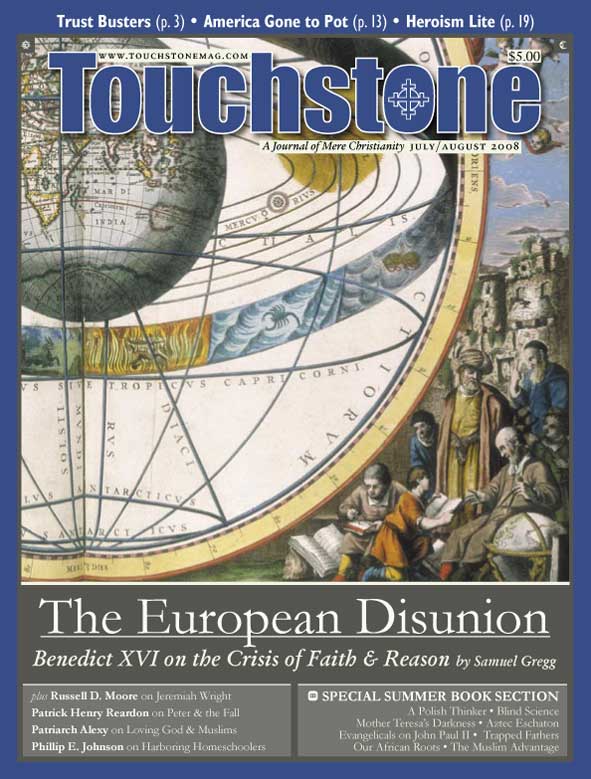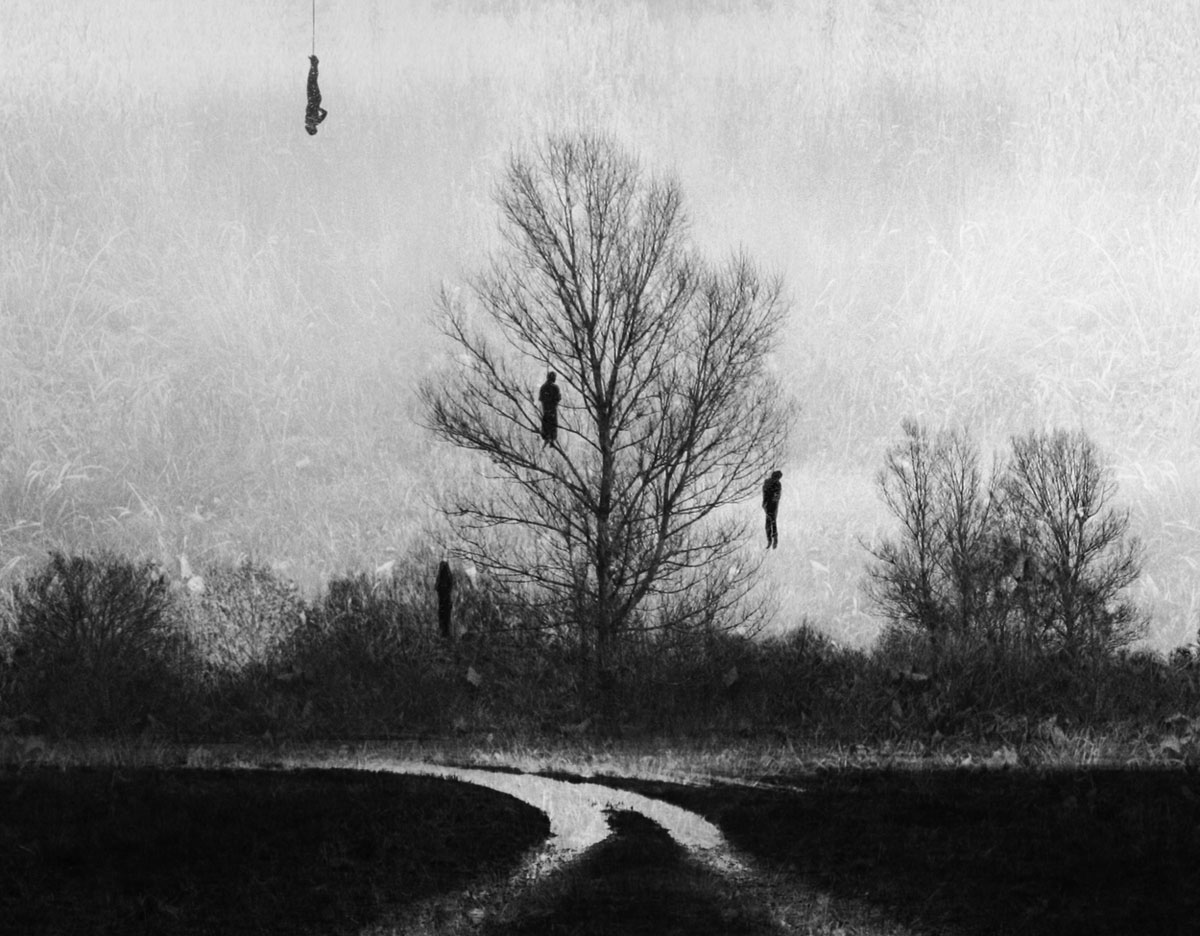The Serpent’s Tale
2012: The Return of Quetzalcoatl
by Daniel Pinchbeck
Penguin, 2007
(416 pages, $10.17, paperback)
reviewed by Matthew J. Milliner
Know your enemy,” wrote Sun Tzu in The Art of War; “Love your enemy,” said Christ. The two are not incompatible. Contemporary Christians, launching recurrent rebuttals to the New Atheism, may have been baited into fighting the last generation’s war. Certainly a response is required, but do the hotheaded children of Bertrand Russell truly represent where most young minds are today?
In the meantime, as C. S. Lewis predicted, not the Materialist, but the Materialist Magician—whom Screwtape called his “perfect work”—may have arrived. Daniel Pinchbeck’s 2012: The Return of Quetzalcoatl provides a frighteningly effective example.
The book has gotten serious attention, from The New York Times to Newsweek, from the Village Voice to a Colbert Report interview. Rolling Stone suggested that Pinchbeck is spearheading a “Psychedelic Revival.”
Materialist Disillusionment
Pinchbeck’s story at times resembles a born-again experience—at least the first half of one. His disillusionment with the materialism of his youth, his longing for the forbidden spiritual aspect of life, is poignant.
When, depressed, he drops out of college, he avails himself of his mother’s literary connections to meet rock stars and famous artists and publish stories of their exploits. “But even the most imaginative acts of perversion, artful cries of despair . . . ceased to thrill me after a while.” He seeks no solace in church or synagogue, “the somber remembrances and archaic vestiges of the past.”
Instead, he recalls his experience with a fistful of mushroom in college, and, under the cover of what might be called a Jungian fundamentalism—that all psychic entities encountered must be subconscious elements patiently waiting to be assimilated—he plunges into the world of archetypes using any method of psychic transport the globe and his connections can afford. His hallucinogenic tourism involves private New Age retreats in Hawaii, tribal initiation rituals with the Bwiti tribe in Gabon, and stints with “Santo Daime,” a psychotropic offshoot of Brazilian Christianity.
After field-testing one recently synthesized compound, powerful enough to make LSD look like a gateway drug, his trip didn’t end. Pinchbeck regrets that he seemed to have “bonded with some fugitive daimon or Luciferic force.” His newly discovered “astral-plane enemies” threaten to kill his family. People connected to him die; his daughter grows ill. “I felt as if I had inadvertently opened the gates of hell.”
Considering Christianity
Flirting with one’s own destruction often generates unique sensitivity to the need for God, and Pinchbeck is no exception. He even manages to conjure up a traditional prayer of repentance after one particularly horrendous trip. “Thank you for this lesson, Creator,” he says, going on to apologize “for the way I had assaulted my body and mind.”
He soon grows disillusioned with New Age spirituality. He tells us that the “banal, burned-out character” of the sexual exploration at the popular Burning Man event “was not all sweetness and light.” “Dressing in fake Day-Glo furs and dancing at all-night trance parties was not impressive as a spiritual discipline.”
He even entertains aspects of Christian faith. He is moved to consider what he had “previously dismissed as specious fantasy—such as . . . the descriptions of Christ’s miracles in the Bible.” He is particularly enamored with the Gospel of Thomas, and excitedly relates how in it, “Christ admonishes his disciples, ‘Those who have two ears better listen!’” Does he realize this is a canonical text par excellence? A concerned friend, the daughter of a Lutheran theologian, sends him Paul’s words in 1 Corinthians 13, which he finds interesting enough to serve as the inscription to the book.
But he quickly reaches a limit. “Millions of Christian Fundamentalists” are lambasted before 2012 reaches its fifth page, and the “cruelly repressive mindset of Catholicism” is out of the question.
Christianity is only acceptable if it is transposed into a gnostic, psychedelic key, sealed with a Jungian prophylactic that “gives us a means of approaching the Judeo-Christian heritage that does not insult our cognitive faculties.” The shift from a serious discussion of crop circles to rejecting traditional Christianity on rationalist grounds is one of the book’s most puzzling aspects.
Psychedelic Nietzsche
Never does Pinchbeck permit a truth to become firm enough to actually claim him, an evasion that he justifies by the tired strategy of evoking the uncertainty of quantum physics. At other times, a truth does seem to grip him, and it’s a horrifying one.
He might be called a sort of psychedelic Nietzsche, one consistent enough to follow his predecessor to insanity. He quotes approvingly Nietzsche’s suggestion that “something might be true while being harmful and dangerous in the highest degree.”
Such is the truth he endures on drug trips, encountering the not necessarily benevolent beings “who run the cosmic candy store.” Tell him that alien abduction theories are absurd, and he will suggest that absurdity may be part of their strategy. As he studied the phenomenon, “it was as if a veil was falling down over my mind and my senses. . . . I felt a pitiful sense of helplessness against this telepathic, sorcerous, affectless enemy.”
Alas, this bleak outlook does not keep the book from being capped with utopian ambitions. Human consciousness, Pinchbeck declares, is evolving, and “this process may well resemble an advance toward a harmonic, perhaps even utopian, situation on Earth.” Not surprisingly, as the Mayan god Quetzalcoatl’s ambassador, Daniel’s role in the coming new order will be central.
Then comes the date. Ever conscious of wearing on his reader’s credulity, it is only after repeated disclaimers that he pinpoints the end of time as we know it—based on the Mayan calendar—to December 21, 2012.
The official transmission from the Mayan god is the disappointing climax of the book, a refried serving of Neale Donald Walsh’s Conversation with God, in which the deity’s revelations resemble evening banter at a northern California wine bar. At one point Quetzalcoatl tells us, through Pinchbeck, “I resonate . . . with the essence of Islam. Islam means submission, surrender, to the will of God—a more polite way of saying this is ‘Go with the flow.’”
Wormwood’s Success
“I have great hopes,” wrote Screwtape to Wormwood,
that we shall learn in due time how to emotionalise and mythologise their science to such an extent that what is, in effect, belief in us (though not under that name) will creep in while the human mind remains closed to belief in the Enemy. The “Life Force”, the worship of sex, and some aspects of Psychoanalysis, may here prove useful.
And now, behold Daniel Pinchbeck: A spiritualist who appeals to cold logic to debunk Christianity, a relativist who has pinpointed the exact date of the end of time, a critic of the Beatnik Creed, “Always do what you want,” who points to bonobo monkeys as a model for human sexual behavior, and a skeptic who considers the devil “a psychic reality that had to be assimilated into consciousness, rather than rejected or repressed.”
It seems that Wormwood has listened well. Pray for Daniel Pinchbeck, and should the Lord tarry, save a spot for him at a candlelight service three days after Quetzalcoatl fails to return.
subscription options
Order
Print/Online Subscription

Get six issues (one year) of Touchstone PLUS full online access including pdf downloads for only $39.95. That's only $3.34 per month!
Order
Online Only
Subscription

Get a one-year full-access subscription to the Touchstone online archives for only $19.95. That's only $1.66 per month!
bulk subscriptions
Order Touchstone subscriptions in bulk and save $10 per sub! Each subscription includes 6 issues of Touchstone plus full online access to touchstonemag.com—including archives, videos, and pdf downloads of recent issues for only $29.95 each! Great for churches or study groups.
Transactions will be processed on a secure server.
more from the online archives
calling all readers
Please Donate
"There are magazines worth reading but few worth saving . . . Touchstone is just such a magazine."
—Alice von Hildebrand
"Here we do not concede one square millimeter of territory to falsehood, folly, contemporary sentimentality, or fashion. We speak the truth, and let God be our judge. . . . Touchstone is the one committedly Christian conservative journal."
—Anthony Esolen, Touchstone senior editor









